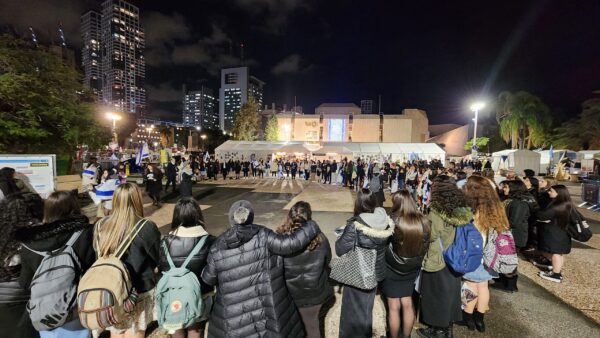
Beyachad Nenatzeach – Together we will prevail
By Adina Frydman, Young Judaea CEO, after traveling to Israel on an Alumni Volunteer trip in January 2024
I am on a plane on my way home from leading a Young Judaea alumni trip to Israel, where we spent 6 days volunteering, bearing witness by hearing stories from survivors, victims, and heroes, and seeing firsthand the physical, emotional, and spiritual toll of this war. The alumni spanned from ages 35 to 75 and represented a range of Young Judaea experiences from our summer camps to our gap year, to our year-round youth programming. What united us was the single-minded mission we were on: to listen, to learn and to help.
This is the first trip to Israel I have led since October 7th, and I had assumptions of what Israel might be like at this time, but what I could not have been prepared for was the atmosphere/the avira of unfolding trauma in Israel. It is very hard to process or move on when it is not yet over. Everyone has a personal connection, someone lost, someone missing, someone serving in or near Gaza or on the Lebanon border. What you feel when talking to people is that there has been a rupture. Not only because of the profound losses but also because of many of the things that Israelis held to be true are now in question.
One thing that is certain is the tremendous resiliency that is emerging in the form of volunteerism, and it is a great unifier. Israelis are a living example of “kol Israel areyvim ze ba zeh” – one caring for the other. Everywhere you look there are acts of hesed/kindness. Families setting up pop up restaurants in gas stations to serve food to soldiers, massive collection and distribution sites led by volunteers to provide essentials to displaced families, individuals taking time off of work to help farmers with their farms, so their harvests are not spoiled, and hundreds more examples of a civil society being built from the grass roots up.
Most Israelis have a clear sense of what needs to be done now, bringing the hostages home, versus what will need to be done when the war is over. They are still very much in it, and clear about the unity that should prevail at this time. As I look around, I see that people are tired, disillusioned, and conflicted. This is the most honest and vulnerable I have seen Israel in my lifetime. Perhaps it is from this authentic and raw place that we will figure out what tomorrow will look like.
As we wrapped up our trip, we wondered how we would bring home what we learned.
There is no simple answer to the question, “how was it?” but we are each bringing back the stories of individuals, the stories that reveal the pain of the loss and the pride of the heroism, the agony of the waiting, and the joy that persists in everyday living. Weddings are still taking place, babies are still being born, and life goes on – it is the ultimate act of resistance. We have a responsibility to share their stories, to show them they are not alone and that we are with them. Everywhere we turned people thanked us, thanked us? Can you believe it? Having given the ultimate sacrifice, it was us who should be thanking them. But the truth is that they feel incredibly isolated, alone, and tired. If each of us took the time in the coming months to go to Israel and to do our small part by listening, hugging, and volunteering, it would help us collectively heal and find the inner strength to figure out what’s next and how we can move together towards that future. No one has the answers now but it is clear that there is no going back to where we were, and it is not yet clear where we need to go.
As the CEO of Young Judaea, one of the oldest Zionist youth movements in North America I spend a lot of time thinking about today’s Jewish youth and their connection to Israel. I am very concerned. This moment has revealed some deep cracks in our approach to Israel education. While this moment has pulled some closer to Israel, it has pushed many further away. We cannot ignore the North American context within which we live that gives preference to universal values over particular/nationalistic ones. We cannot ignore that a large segment of our Jewish youth got the memo about caring about humanity, and although this is a great thing, somehow it creates a blind spot when it comes to Israel because it doesn’t fit neatly in the narrative for us to be the oppressed. We cannot ignore that even Israelis have found a way to love and to criticize Israel but that somehow for North Americans, Israel has become so precious, the narrative so polished that we created an impossible ideal, one built mostly on hasbara/advocacy, that is sure to disappoint.
Our teens, college students and young adults are lost at this moment. We have not prepared them, and we have only fed into the binaries of left and right and pro or anti that are driving them out instead of keeping them connected.
At Young Judaea, we talk about a Zionist big tent, a safe space for youth to learn about, engage with, and think critically about Israel. Underlying is a deep and unwavering Ahavat Israel, not a love specifically of Israeli government or military policies of any given moment, but an abiding love for the Israel that ought to be. The Israel of our Zionist dreams and the one that we commit to work towards. Alongside that love of Zionism is a commitment to tikkun olam, to repairing the broader world. A commitment to both our particular and universal ideals. We don’t have to choose; they can stand side by side. We marched for civil rights for African Americans AND for freeing of our soviet Jewry, we advocate for humanitarian aid for Gazans AND condemn the horrific massacre against our people enacted by Hamas. We can proclaim that “all people matter” AND that we have a unique responsibility to our Jewish community.
The most vulnerable among us at this moment are those who closely align with social justice causes and communities yet feel deeply connected yet conflicted about Israel. They have been shunned by their fellow social justice advocates simply because they are Jewish, and anti-Israel and anti-Jewish sentiments are now co-mingled, yet they feel conflicted about an a purely pro-Israel approach. These young Jews are literally in no-man’s land, and we are at risk of losing them. How can we create a place in our tents for them? They represent the “troubled committed,” as Donniel Hartman would say.
Can we model the vulnerability and honesty of Israelis at this moment, acknowledging both the resolve and support while engaging in deep heshbon hanefesh, soul searching for what we want this nation-state of ours to become? What is our role in that? How can we, as North American Zionist organizations model the unity that is so desperately needed to help us emerge triumphant in this moment.
Gil Troy, historian and scholar of Zionism, and Young Judaea alum, said it this way during the closing talk of our trip. Everywhere in Israel we see the words, “B’yachad N’natzeach”. But N’natzeach is not necessarily only about a military victory, it is about the fact that together, only in unity, will we triumph, rebuilding our individual and collective spirit, our inter and intra community relationships, our civil society, enacting our historic and renewed Zionist ideals. Although alone we may feel defeated, together, we will prevail.
I was struck with the group traveling how connected we felt at the end of the trip, yes, we had experienced something transformational and been vulnerable together, but more than that, it was the experience of this trip that reignited our Young Judaean ideals. Deep down within each of us is that optimistic child, who, fueled by their idealism and encouraged by their group of friends, can work toward a better tomorrow. That is the ageless power of being part of this movement.
